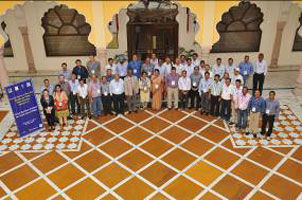
The growing interest of national agriculture research system (NARS) of South Asia in genetic gains and seed dissemination work in Cereal Systems Initiative for South Asia (CSISA) objective 4 (wheat breeding), 50 scientists from Bangladesh, Bhutan, India and Nepal assembled at Karnal, India on September 2-3, 2015 for the 7th Wheat Breeding Review Meeting of this project. The meeting was organized by CIMMYT’s Kathmandu office with support from CIMMYT-Delhi/Karnal office and led by Dr. Arun Joshi. Dr. Ravish Chatrath, IIWBR provided strong support as local organizer.
The other CIMMYT participants were Etienne Duveiller, Uttam Kumar and Alistair Pask. Participants included representatives of: the Wheat Research Centre of Bangladesh (Dinajpur); Bangladesh Agriculture Research Institute (BARI), Ghazipur; India’s Directorate of Wheat Research (DWR), Karnal and Shimla; the Indian Agricultural Research Institute (IARI), Delhi and Indore; Punjab Agricultural University, Ludhiana; Banaras Hindu University, Varanasi; the University of Agricultural Sciences, Dharwad; Uttarbanga Krishi Vishwa Vidyalaya, Coochbehar, West Bengal; Jawaharlal Nehru Krishi Vishwavidyalaya, Jabalpur and Powarkheda; Govind Vallabh Pant University of Agriculture and Technology, Pantnagar; Indian Institute of Science Education and Research (IISER), Kolkata, Mohanpur, Distt. Nadia, W. Bengal; Nepal’s National Wheat Research Program (NWRP), Bhairahwa; Nepal Agricultural Research Institute (NARI); Khumaltar of Nepal Agricultural Research Council (NARC) and Renewable Natural Resources (RNR), Research and Development Centre (RDC), Bajo, Bhutan.
The CSISA meeting began with remarks by the chief guest, Dr. Indu Sharma, Director, IIWBR, Karnal along with Dr. Md. Rafiqul Islam Mondal, Director General, BARI; Etienne Duveiller, CIMMYT, Delhi and Arun Joshi, CIMMYT, Kathmandu. Within a wider framework of discussing issues concerning wheat improvement, the CSISA meeting reviewed the progress of the 2014-15 cycle, and established work plans for the coming crop cycle. Arun Joshi presented a summary of the achievements in wheat breeding over last 6 years and highlighted the impressive results obtained in varietal release, seed dissemination and impact in farmer fields. Dr. Etienne informed he challenges of climate change and the ways our program should be shaped to handle these issues. Dr. Mondal expressed his happiness that CSISA wheat breeding has been very successful in contributing to enhancement of wheat production and producitity in Bangladesh and other countries through a vigourous wheat breeding and seed dissemination with strong linkage with national centres.
Dr. Indu Sharma highlighted the significance of collaborative research with a regional perspective and told the audience about the successes being achieved by CSISA in wheat research especially in handling rust resistance and heat tolerance in south Asia. She expressed his appreciation for new research efforts under CSISA and said that “the South Asia-CIMMYT collaboration is paramount to the food security and livelihood of the farmers.” She also said that seeing new challenges there is much more need for such collaborative research efforts for the economic prosperity and good health of agriculture sector in south Asia.
Four review sessions were conducted, chaired by NARS colleagues Dr. Indu Sharma, Dr. Mondal, Dr. Ravi Pratap Singh and Dr. S.P. Khatiwada. Three sessions were used to present review reports and work plans from the 10 research centers, while two other sessions discussed progress in physiology, spot blotch and strengthening linkage of wheat breeding with seed dissemination and capacity building in South Asia. A major discussion was held to devise strategies to strengthen research to handle future threats to wheat such as yellow rust, early and late heat stress, water scarcity and to enable environment for fast track release of varieties so that new seed can reach to farmers as soon as possible.
Arun Joshi also highlighted major achievements in CSISA wheat breeding through very able collaboration by national centres in South Asia. He emphasized that breeding for biotic and abiotic stress tolerance gained momentum through CSISA by developing varieties with faster grain filling and flexibility to adapt to a range of sowing dates. Not only these new varieties were developed, improved networking with public and private sector seed hubs enabled fast track inclusion of these varieties in seed dissemination chain. The increase germplasm flow from CIMMYT, Mexico enriched Indian gene bank with a large reservoir of diverse set of genotypes for current and future used. The continued inclusion of resistance to Ug99 and other rusts in wheat lines kept diseases at bay and safeguarded farmers. There is increased use of physiological tools for heat and drought tolerance and stronger links were established between breeders, seed producers and farmers. Another significant achievement was strengthened capacity building in the region.
A talk on wheat research as Borlaug Institute for South Asia (BISA) was delivered by Uttam Kumar, CIMMYT. Likewise progress on CRP project on spot blotch was presented by Shree Pandey and Ramesh Chand, India. A talk on wheat breeding at Bhutan was presented by Sangay Tshewang. He was happy to inform that through this networking and collaboration with CIMMYT, Bhutan was able to release three new wheat varieties after a gap of 20 years.
On the 2nd day, a visit to IIWBR was organized. Dr. Indu Sharma and her team of scientists led by Dr. Ravish Chatrath facilitated this visit. The participants were taken to different laboratories and current research activities were explained. The participants from Nepal, Bangladesh and Bhutan expressed desire for increased exchange visits among research institutions of countries in south Asia.
The review meeting enabled CSISA wheat researchers to measure their achievements compared to the challenges being encountered and enabled an environment to discuss future strategies to augment research activities better tuned to future targets in the region. The participants were of the view that strong linkage and coordination between the national research program, the CIMMYT team and other stakeholders especially those in seed business is needed to achieve comprehensive progress towards increasing food availability and better livelihood of masses.
 Capacity development
Capacity development